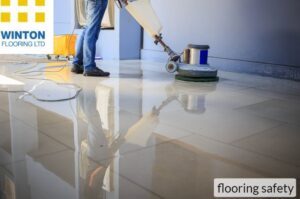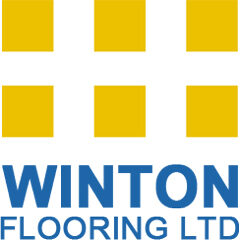There is nothing more important than ensuring the safety and wellbeing of those who work in a particular environment. There are many factors that should be taken into account, such as whether or not there is sufficient lighting, how to avoid slips and trips, and what surface best suits the activity taking place on it. In this blog post we will highlight some top flooring safety tips that every workplace needs to know!
 Flooring safety is a concern for many businesses. There are many potential hazards to be aware of. Whether you have carpet, hardwood, or tile floors, there are some basic guidelines that will help to keep your employees safe and healthy.
Flooring safety is a concern for many businesses. There are many potential hazards to be aware of. Whether you have carpet, hardwood, or tile floors, there are some basic guidelines that will help to keep your employees safe and healthy.
Slips and trips are the most common flooring hazards in a work environment. Make sure to clean up spills immediately, make your floor as slip-resistant as possible (not too slippery), and ensure that there is proper lighting around all areas of activity so you can see flooring hazards clearly. It’s also important for employees to have access to floor mats to stand on.
There are numerous other flooring hazards that may occur, depending on what you do at work and where exactly it occurs in the building. If flooring is exposed to chemicals or dangerous materials, then there needs to be proper ventilation around areas of activity as well as adequate eye protection for those involved with handling these materials.
Make sure flooring is durable and doesn’t crack easily, so that when there are accidents they don’t lead to worse injuries. If flooring is made of materials such as metal or concrete, you need anti-fatigue mats for added comfort and durability in the long run.
Follow these tips to ensure a safe environment for everyone in the workplace:
1) Use mats at entrances of high-traffic areas where people walk on wet feet.
2) Make sure all spills are cleaned up as soon as possible. When mopping floors, make sure not to leave any water on the floor as this can cause slip hazards even if it’s been dried with a mop or towel.
3) Add more lighting near stairs and doorways so people won’t trip over objects they don’t see.
4) Any damaged flooring area is likely to be uneven, so make sure it’s stable before walking on the floor.
Choosing the right material, colour and texture of your flooring are all important factors to consider when flooring your business or commercial premises. If you need a helping hand in choosing the right type of flooring for your commercial or industrial premises then give our flooring team a call at Winton Flooring on 0161 773 3895 and we will be happy to assist you.

